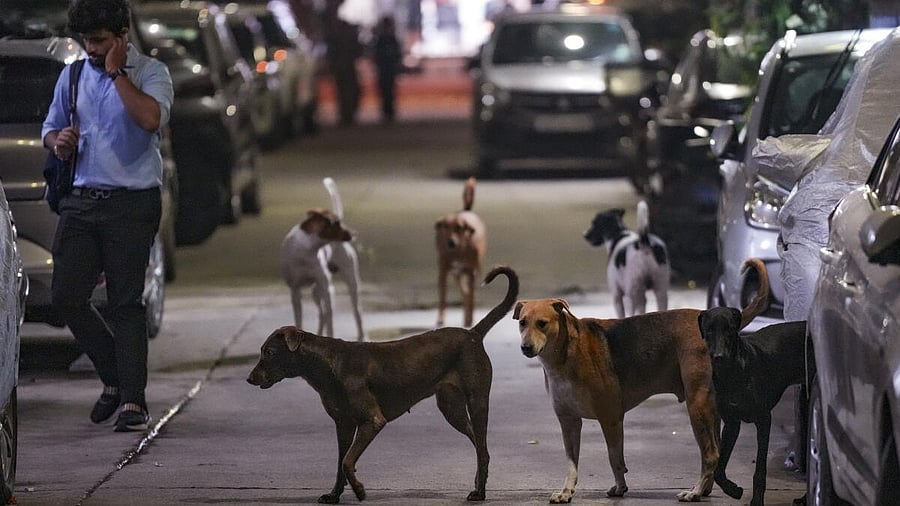
Stray dogs at a street at Shalimar Bagh area, in New Delhi
Credit: PTI Photo
Before entering animal welfare, I had no reason to reflect on difficult questions. That changed in 2020, when I began my journey in the animal rights movement. From working at a policy organisation to joining a rescue and rehabilitation NGO and finally moving into independent activism, I encountered both the best and the worst of the field.
What struck me most was not the cruelty from outsiders, but the divisions within. Why did NGOs compete rather than collaborate? Why were some activists treated as “outsiders” for breaking arbitrary rules — what one wore in government meetings, what one ate, or which “big name” one aligned with? Why did some in leadership shun those who spoke to the media or refused to stay silent about wrongdoing?
I have seen NGOs quietly euthanise healthy animals and been told to “keep quiet” when I objected. I have seen government veterinarians falsify post-mortem reports to derail cruelty cases. I have seen SPCAs without animal lovers and state welfare boards that exist only on paper. For many of us who entered with pure intent, the hardest battles have been with entrenched interests within our own community.
So why persist? Because unlike the system that has failed to act, we see the bigger picture. If friendly, vaccinated community dogs are displaced, semi-feral and feral dogs will move in—unsocialised, unvaccinated, and unsafe. That not only threatens public safety but also erases years of vaccination and sterilisation efforts, the only humane and scientifically proven methods of population control worldwide.
We do this because we know what policymakers ignore: dogs play a vital role in maintaining ecological balance. And yet beyond science, what sustains us are those wagging tails at the end of long days.
But something changed on August 11 when a bench of the Supreme Court issued an order that sent shockwaves across the country. This wasn’t about one cruelty case in one city. It was about all of us. It was about Inia’s street dogs being branded as nuisances to be removed. The Rajasthan High Court echoed the order. For the first time, animal lovers across India felt the ground slip from beneath them.
Many applauded the judgement, believing it would protect the children. Some even argued that it would “save” dogs. The truth is darker. The SC has overturned decades of scientific consensus and constitutional compassion. This is not a rescue plan. It is a death sentence in disguise.
The ruling states that once dogs are picked up, they can never be released—not even if sterilised, vaccinated, or healthy. They cannot be adopted either. Every petition and scientific suggestion from experts, veterinarians, and welfare groups was denied a hearing. And in that silence, a roadmap emerges—not for public safety, but for commercial exploitation. With no indies left to adopt, families will be nudged towards a cruel supply chain of pedigree puppies – puppies from unlicensed shops, pet shops, and online sales, riddled with cruelty. Rules regulating breeders exist, but enforcement is weak; this order opens the floodgates.
Street dogs are not a social inconvenience; they are part of an ecological system that sustains balance in cities. By scavenging waste and competing with other species, they keep rat and rodent populations in check. Remove them, and the void is filled not by safety but by vermin -- rodents and mammals that can spread rabies and other diseases far harder to control.
History warns us. In the Netherlands, 19th-century dog culling coincided with one of Europe’s worst rabies outbreaks. More recently, cities attempting mass dog removal have seen spikes in leptospirosis, a bacterial infection spread by rat urine that thrives in urban flooding.
This judgement is not a solution but an erasure: of millions of innocent lives, of desi dogs who have lived beside us for centuries, and of the moral fabric that defines us as a people.
The SC verdict, shocking as it was, did what decades of infighting could not: it united us.
So I must say this — to Justices J B Pardiwala and R Mahadevan: we strongly oppose your judgement, and we will fight it with every fibre of our being. But we also thank you. For in trying to silence India’s dogs, you have awakened their human protectors.
Today, from Delhi to Jaipur, from Mumbai to small towns, we are speaking in one voice. For Kali, for Bhuru, for Rani — for every street dog who has wagged a tail at us, guarded us, lived with us. The government and media may try to pit neighbours against each other.
The courts may ignore precedents and official data. Supporters may celebrate this as a triumph. But what the Court has done is remind us of who we are. We are the voice of India’s animals. We are the inheritors of Gandhi’s Ahimsa. And we will not let this country go down in history as the land that abandoned its vulnerable.
(The writer is an animal rights activist)